Answer these simple questions and we will find you the BEST prices
Which type of solar quotes do you need?
It only takes 30 seconds
100% free with no obligation

Get Free quotes from insulation specialists near you

Save money by comparing quotes and choosing the most competitive offer

The service is 100% free and with no obligation
- GreenMatch
- Insulation
- Bathroom Insulation
- Bathroom Wall Insulation
Bathroom Wall Insulation: Benefits, Types & Costs

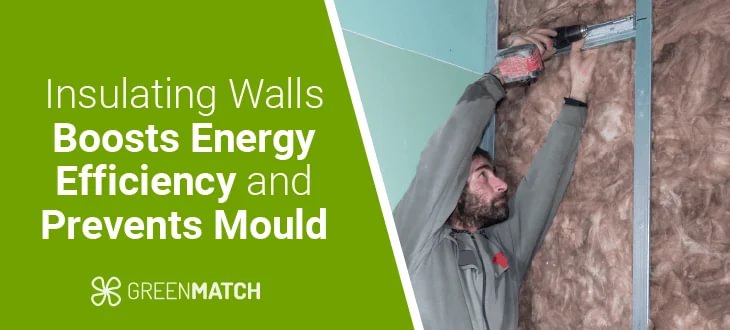
- Insulating bathroom walls provides multiple benefits, from improving energy efficiency and aiding in mould and mildew prevention to enhancing noise reduction and overall comfort.
- The advantages of bathroom wall insulation make it a valuable investment.
- The cost of insulation varies from £5 to £21.5 per square metre, depending on the type of material used and the chosen installation method.
In the UK's cool, damp climate, bathroom wall insulation is more than just a home improvement - it's a crucial investment in comfort, health, and long-term savings.
According to an analysis by the Institute of Health Equity and Friends of the Earth, almost 10 million households across the UK are living in cold, damp, and poorly insulated homes. This situation not only leads to higher energy bills but also poses significant health risks, such as respiratory problems, particularly for children and vulnerable populations.
Bathroom wall insulation offers a targeted and manageable starting point for homeowners looking to improve their home’s energy efficiency without undertaking a full-scale renovation. Insulating bathroom walls can significantly reduce heat loss, prevent mould growth in damp-prone areas, and reduce noise.
Ready to get started on your bathroom insulation project? Simply click the button, and we’ll send you up to 3 free home-tailored quotes from professional installers in your area. Click below to begin!
Fill in the form in just 1 minute
Why you should insulate your bathroom walls
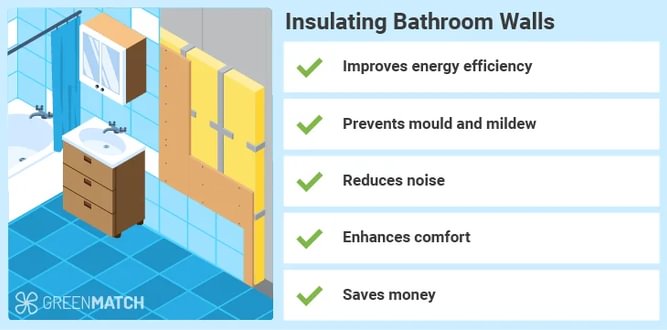
In the UK, where homes often contend with a cool, damp climate, insulating bathroom walls is essential for home improvement. Proper insulation addresses several key concerns: energy efficiency, mould and mildew prevention, noise reduction, and increased comfort. Let’s explore why bathroom wall insulation is crucial.
Energy efficiency
One of the main advantages of insulating bathroom walls is boosting energy efficiency. Due to their exposure to high moisture levels, bathrooms often lose heat quickly, making them feel colder than other rooms.
Insulation acts as a thermal barrier, helping to retain heat and reduce the need for excessive heating. This leads to lower energy bills and creates a more environmentally friendly home by reducing energy consumption. Proper insulation supports energy-saving goals, contributing to a lower carbon footprint and overall home efficiency.
Mould and mildew prevention
Bathrooms are susceptible to moisture, leading to mould and mildew problems if not properly managed. Insulating the walls helps control moisture levels by maintaining a consistent temperature and reducing condensation when warm, moist air meets cooler surfaces. This is crucial for preventing mould and mildew growth, which protects the structural integrity of your home and promotes a healthier living environment by preventing the spread of mould spores that can negatively impact indoor air quality.
Noise reduction
Another significant benefit of insulating bathroom walls is the improvement in noise reduction. Bathrooms can be noisy due to running water, flushing toilets, and exhaust fans. Insulation is a sound barrier, absorbing these noises and creating a quieter, more peaceful environment.
This enhancement in privacy and comfort is particularly valuable in homes with bathrooms adjacent to living areas or bedrooms, helping prevent disturbances and maintain a tranquil atmosphere.
Increased comfort
Insulating your bathroom walls also significantly enhances overall comfort. Insulation helps maintain a stable temperature in the bathroom, which is especially important during colder months. It prevents cold drafts and helps the bathroom retain warmth, making it more comfortable after showers or baths.
Additionally, insulation prevents heat from escaping into adjacent rooms, ensuring a more balanced temperature throughout the home. This consistent warmth contributes to a cosier, more enjoyable living environment year-round.
Cost savings
While an initial cost is associated with installing bathroom wall insulation, the long-term cost savings can be substantial. Lower energy bills due to reduced heat loss, reduced costs associated with mould remediation, and fewer repairs from moisture damage all contribute to significant savings over time.
Investing in insulation can also help avoid costly structural damage caused by persistent moisture and temperature fluctuations. These savings make the investment in insulation worthwhile in the long run.
Best insulation for bathroom walls
Insulating bathroom walls is essential for comfort and energy efficiency, especially in moisture-prone areas. The top choices are spray foam, known for its excellent moisture resistance, and rigid foam for good thermal efficiency. Polystyrene foam is less effective but more affordable—other options like mineral wool, fibreglass batt, and reflective foil suit various needs and budgets. Let’s find the best option for your bathroom walls.
Spray foam insulation
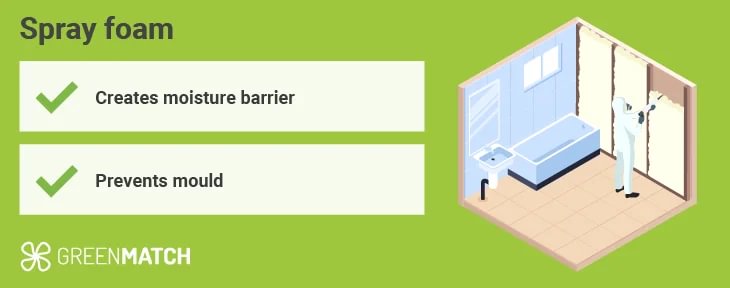
Spray foam insulation is the most effective choice for bathroom walls due to its ability to expand and create an airtight seal. This insulation type provides excellent thermal insulation and moisture resistance, preventing heat loss and reducing mould and mildew risks.
Given the UK’s climate, where dampness is common, spray foam's moisture-blocking properties make it particularly suitable. However, it typically requires installation from professional insulation contractors to comply with UK building regulations.
- Superior moisture resistance: Excellent at creating a moisture barrier.
- Airtight seal: Expands to fill gaps, sealing against air and water leaks.
- Prevents mould: Helps prevent mould by keeping walls dry.
- Professional installation required: Generally requires a professional for proper application.
- Off-gassing: Can release chemicals during and shortly after installation, needing proper ventilation.
Rigid foam insulation
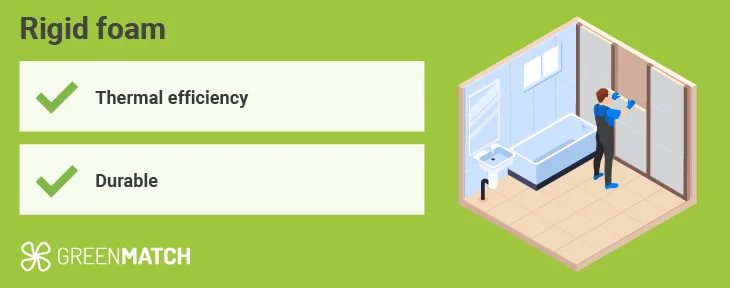
Rigid foam insulation offers solid moisture resistance and an excellent thermal barrier, making it a practical choice for bathroom walls. It comes in panels that can be cut to size and fitted between wall studs, providing a manageable solution for those with DIY skills.
Rigid foam can be effective in the UK's variable climate, especially in bathrooms where moisture control is critical. This insulation type balances cost, ease of installation, and performance well, making it a common choice for many UK homes.
- Excellent thermal efficiency: Provides strong insulation with a high R-value.
- Good moisture resistance: Effective at preventing water infiltration.
- Durable: Maintains its form and effectiveness over time without settling.
- More difficult to install: Requires precise cutting and fitting.
- Needs proper sealing: Joints must be well-sealed to prevent moisture intrusion.
Polystyrene foam insulation
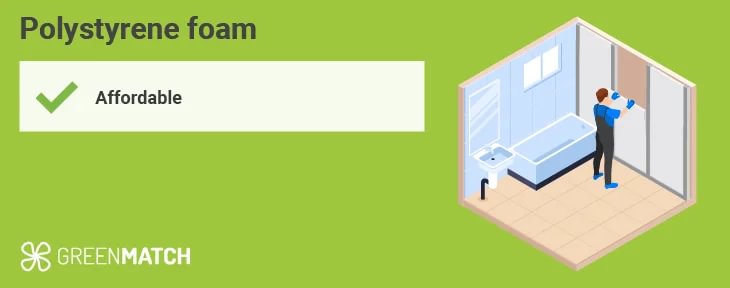
Polystyrene foam insulation is less effective than spray foam or rigid foam but offers basic moisture resistance and insulation properties. It is lightweight and easy to handle, making it suitable for DIY enthusiasts who want to tackle insulation projects.
While it doesn’t provide the same level of airtight seal or thermal efficacy as thermally enriched spray foam, it can still offer an affordable option for those on a budget. However, its lower effectiveness makes it less ideal for areas with high moisture exposure, like bathrooms.
Mineral wool insulation
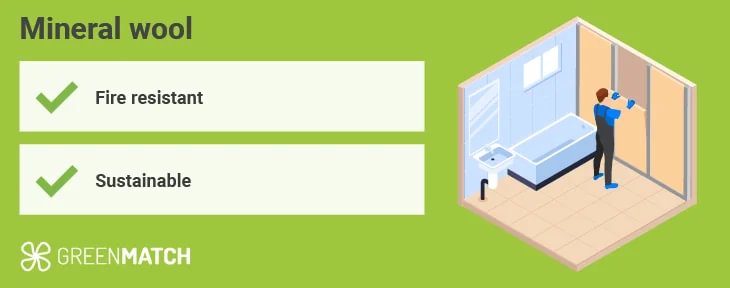
Mineral wool insulation is an excellent option because of its fire resistance, soundproofing, and good thermal properties. In the UK, it is favoured for its ability to withstand moisture while providing effective insulation.
Mineral wool is also eco-friendly, often made from recycled materials, and is easy to install. It is ideal for those looking for a balance between moisture resistance and environmental impact. However, additional vapour barriers may be required to prevent moisture penetration in bathroom settings.
- Good soundproofing: Effective at blocking sound.
- Moderate moisture resistance: Better than some materials at resisting moisture.
- Fire resistant: Naturally non-combustible.
- Sustainable: Often made from recycled materials, making it environmentally friendly.
- Can irritate skin and lungs: Requires careful handling and protective equipment.
- May need extra moisture protection: Additional barriers might be required in very humid conditions.
Fibreglass batt insulation
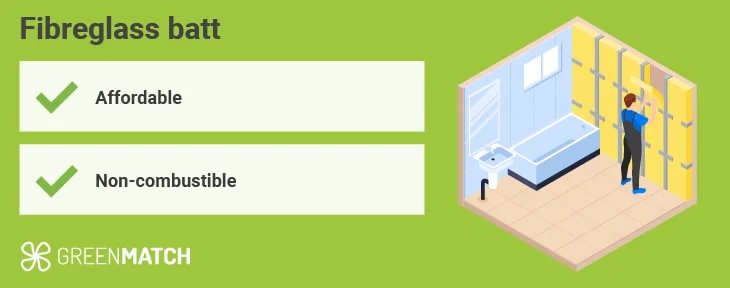
Fibreglass batt insulation is a common and cost-effective choice for home insulation. While it offers decent thermal insulation and is easy to install, it is only suitable for bathrooms with a proper vapour barrier due to its tendency to absorb moisture, which can lead to mould and mildew growth.
This makes it only ideal for areas with high humidity if additional moisture control measures are taken.
- Affordable: A cost-effective insulation option.
- Easy to install: Ideal for DIY projects due to its simplicity.
- Non-combustible: Naturally resistant to fire.
- Less moisture resistant: Can absorb moisture, leading to mould if not properly sealed.
- Requires a vapour barrier: Needs additional protection against dampness in bathrooms.
- Can settle over time: May compress, reducing its insulating effectiveness.
Reflective foil insulation
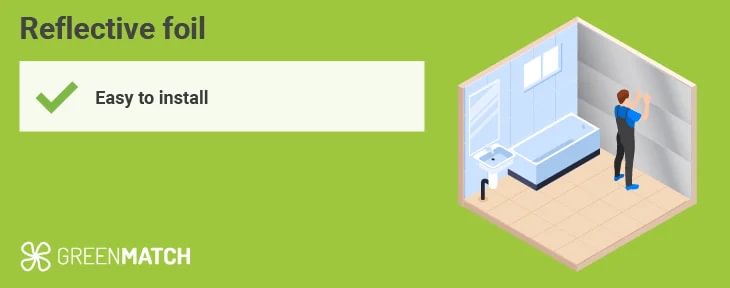
Reflective foil insulation reflects radiant heat, making it effective in hot and cold climates. It is lightweight and easy to install and is often used in combination with other types of insulation to enhance thermal performance.
While not specifically designed for high-moisture areas, it can be useful when combined with other materials that provide a vapour barrier. This adds an extra layer of insulation and helps to control condensation on bathroom walls.
What is the best insulation for bathroom stud walls?
The best insulation for bathroom stud walls is spray foam insulation, which expands and fills gaps, creating an airtight and moisture-resistant barrier. This makes it highly effective in preventing heat loss and dampness. Rigid foam insulation is another excellent option, offering good thermal efficiency and moisture resistance.
For those seeking a more budget-friendly choice, mineral wool insulation balances moisture resistance and soundproofing. Each option should be considered based on the bathroom's specific needs, such as humidity levels and the desired ease of installation.
How to insulate bathroom walls
When insulating walls, the approach varies slightly depending on whether you deal with external or internal walls. Both types require effective moisture management, but exterior walls need additional considerations due to their direct exposure to outdoor elements.
Insulating bathroom exterior walls
Insulation is essential for exterior walls to prevent heat loss and protect against moisture from outside. Spray or rigid foam and a vapour barrier helps maintain thermal efficiency and prevent dampness. Here are the key steps to properly insulate your bathroom's exterior walls.
- Choose appropriate insulation: Opt for spray foam or rigid foam insulation for exterior walls. These materials provide excellent moisture resistance and thermal insulation, which are crucial for preventing heat loss and dampness from outdoor exposure.
- Seal any cracks or gaps: Before installing insulation, inspect the exterior wall for cracks or gaps and seal them with caulk or expanding foam to prevent moisture infiltration.
- Install a vapour barrier: A vapour barrier is crucial for exterior walls to prevent moisture from penetrating the wall cavity from outside. Install the barrier on the interior side of the wall (warm side) to block moisture from entering the insulation.
- Fit the insulation: Cut the insulation material tightly between the studs. For spray foam, hire a professional to apply it evenly and thoroughly fill all gaps.
- Install moisture-resistant drywall: Cover the insulated wall with moisture-resistant drywall to protect against humidity and potential water exposure inside the bathroom.
- Seal and finish: Use waterproof caulk to seal all edges and joints, then finish with water-resistant paint or tiles.
Insulating internal bathroom walls
Internal walls need insulation to manage moisture and reduce noise. To prevent moisture buildup and maintain comfort, opt for mineral wool or fibreglass batts with a vapour barrier. Follow these steps to insulate internal bathroom walls effectively.
- Select the right insulation: For internal walls, consider mineral wool for its soundproofing qualities and moderate moisture resistance. Fibreglass batts are also an option but must be paired with a vapour barrier to prevent moisture buildup.
- Prepare the wall space: Remove the existing drywall and expose the studs. Ensure the wall cavity is clean and ready for insulation.
- Install a vapour barrier: A vapour barrier is recommended for internal walls to prevent moisture from bathrooms (like steam from showers) from entering the wall cavity and causing mould growth.
- Install insulation between studs: Fit the insulation material snugly between the wall studs. Make sure it is correctly placed without any gaps to maximise its effectiveness. Mineral wool is ideal for both soundproofing and moisture control.
- Cover with moisture-resistant drywall: Use moisture-resistant drywall to cover the insulated internal walls, ensuring they are protected from the humid bathroom environment.
- Seal joints and finish: Apply waterproof caulk around all edges and seams to prevent moisture intrusion. Finish with paint or tiling for added protection and aesthetics.
Bathroom wall insulation cost in the UK
The cost of bathroom wall insulation in the UK varies based on the type of insulation material, the size of the bathroom, and whether you opt for a DIY approach or professional installation. The average insulation prices range from £5 to £21.5 per m².
Average cost range
The typical cost of insulating bathroom walls in the UK is between £5 and £21.5 per m². The cost depends on the type of insulation material used:
| Insulation material | Cost per m² |
|---|---|
| Fibreglass batts | £10 |
| Mineral wool | £13 - £17.5 |
| Rigid foam boards | £5 - £15 |
| Spray foam | £21.5 |
These figures reflect the varying costs of materials and their installation. Spray foam insulation is the most expensive due to its superior performance and professional installation requirements, while fibreglass batts are more budget-friendly but may require additional measures for moisture control.
Factors affecting the cost
Several factors can influence the cost of bathroom wall insulation:
- Type of insulation: Materials like spray foam are more costly due to their superior moisture resistance and thermal efficiency, whereas fibreglass batts are less expensive but may require additional vapour barriers.
- Size of the bathroom: Larger bathrooms require more insulation, increasing costs.
- Installation method: Professional installation is more expensive but ensures proper application, especially for materials like spray foam. DIY can save costs but might achieve a different level of effectiveness.
- Accessibility of walls: Walls that are difficult to access or require extra preparation (like removing old insulation) can increase labour costs.
- Local labour rates: Costs can vary depending on the regional labour rates across the UK.
Now that you're informed about the best options for bathroom insulation, it's time to take the next step! Click the button below to kickstart your journey and receive up to 3 free, personalised quotes from trusted local professionals. Don’t wait—get started today and ensure your bathroom is insulated just right!
Fill in the form in just 1 minute
FAQ
The best insulation for bathroom walls is spray foam due to its superior moisture resistance and ability to create an airtight seal, preventing dampness and heat loss. Rigid foam boards are also an excellent option for their high thermal efficiency and moisture resistance.
Yes, insulating bathroom walls is worth it. Proper insulation improves energy efficiency by reducing heat loss, keeps the bathroom comfortable by maintaining a stable temperature, and helps prevent moisture-related issues like mould and mildew.
To insulate a cold bathroom wall, use moisture-resistant insulation like spray foam or rigid foam boards. Seal any gaps with caulk, add a vapour barrier, and fit the insulation between the studs. Finish with moisture-resistant drywall to protect against moisture.
Yes, most bathroom walls need a vapour barrier to prevent moisture from penetrating the wall cavity. This is especially important in high-humidity areas like bathrooms, where moisture can grow mould and damage insulation materials.
The best insulation for bathroom stud walls is spray foam, which provides excellent moisture resistance and fills all gaps to create an airtight seal. Mineral wool is also effective as a more budget-friendly option due to its soundproofing and moderate moisture resistance.

Nicole Bea Kerr is a content writer for Greenmatch, leveraging her experience in B2B journalism and editing. She is interested in bringing more awareness to sustainability through informative narratives.
We strive to connect our customers with the right product and supplier. Would you like to be part of GreenMatch?

